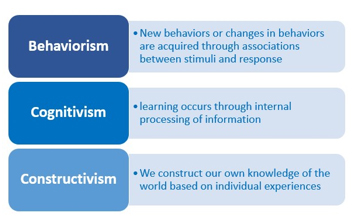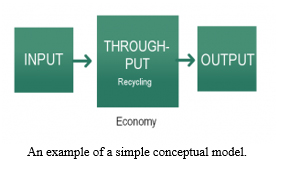Online Course
NURS 787 - Theoretical Foundations of Teaching and Learning
Module 3: Major Theories of Learning
Explore Learning Theories

What are theories of learning?
Theories provide general explanations for observations made over time by attempting to explain, inform, guide, and/or predict behavior. It is important to note that theories can never be proven beyond a reasonable doubt. Theories may be modified to meet individual needs and goals.
A theory:
- is made up of concepts linked to a high level of detail
- describes, explains, and/or predicts
- varies in scope, but is highly specific
- informs our decision making and practice
Learning theories describe the ways that theorists believe people learn new ideas and concepts. Often, they explain the relationship between information we already know and the new information we are trying to learn.
Some famous theories include Leininger’s Transcultural Nursing Theory, Von Neumann and Morgenstern’s Game Theory, Einstein’s Theory of Relativity, Planck’s Quantum Theory, and Copernicus’s Theory of Heliocentrism, which describes how the earth revolves around the sun!

Learning theories focus on primary concepts, not isolated facts. They look at:
- understanding wholes as well as parts.
- understanding parts in the context of wholes.
Therefore, the learning process focuses on primary concepts, not isolated facts.
When you review the literature on learning theories, you will find that there are theories and authors of theories. For example, you will find 'behaviorism' and 'Watson". Behaviorism is the theory and there are many behaviorists and Watson is one behaviorist.
The theories can also be categorized into learning/content domains and concepts. Learning domains include learning through cognitive, psychomotor and affective modes. Theories that are based on cognitive learning (informational learning) are categorized together and the same is true for affective (emotional learning) and psychomotor (physical) theories. Theories are also categorized by content domains, for example, the theories most applicable to medicine or engineering.
Theories can also be categorized by concepts. Theories related to mental models or feedback and reinforcement, for example, can be categorized together.
Since many learning theories exist and are categorized by different methods, we will explore three major categories of theories: behaviorism, cognitivism and constructivism.

These brief videos featuring “Teacher Tony” give a basic and somewhat humorous overview of these three major learning theories, Behaviorist, Cognitive, and Constructivist. You may find them useful to get you started thinking how theory can be used in teaching and learning.
Some of the theories are so widely used that they are recognized as 'major' theories. Theories can also be combined to allow for consideration of the developmental stage of the learner (for example, Piaget, Kohlberg, Knowles) and learning styles. This module will focus on the major theories.
What are models of learning?
A conceptual model (conceptual framework or conceptual system):
- relates to broad ideas thus offer a perspective or “world view”
- is made up of concepts and statements put together in a meaningful way
- may be verbal or schematic
Models of the teaching-learning process are described by McIlrath and Huitt.
Instructional design models are also plentiful, and several are highlighted on this interesting Instructional Design Central website

Why are theories and models important in learning?
When you review different theories and models, look at the underlying beliefs or premises about the theory/model, see how they connect, and think about the antecedents and consequences. Consider how a selected theory/model is similar to and differs from others. How is learning defined by this theory/model?

Reflection Activity:
Find one theory/model from the resources listed in this module and search for more information about the theory. Use this information in forming your answers to the discussion question.
This website is maintained by the University of Maryland School of Nursing (UMSON) Office of Learning Technologies. The UMSON logo and all other contents of this website are the sole property of UMSON and may not be used for any purpose without prior written consent. Links to other websites do not constitute or imply an endorsement of those sites, their content, or their products and services. Please send comments, corrections, and link improvements to nrsonline@umaryland.edu.